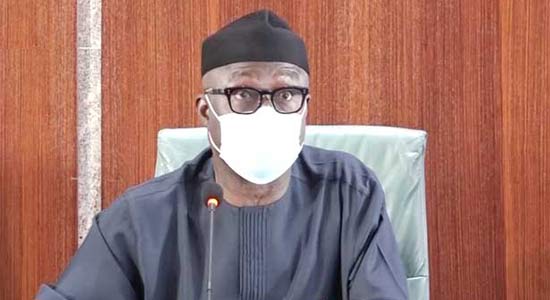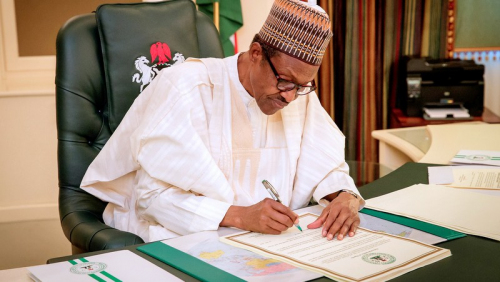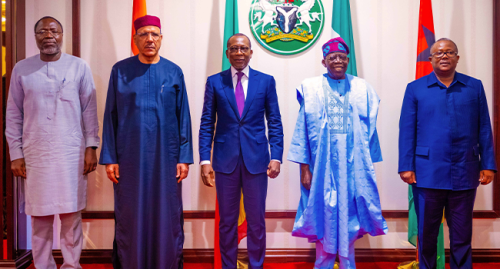THE EXECUTIVE 29/03/2022
FG Moves To Review Trade Policy, Inaugurates Committee

THE Federal Government on Monday inaugurated a committee set up to review Nigeria’s trade policy.
Inaugurating the committee in Abuja, Minister of Industry, Trade and Investment Adeniyi Adebayo said the Federal Government plans to use international trade and investment as veritable tools for economic growth and poverty reduction.
Members of the committee were drawn from the Federal Ministry of Industry, Trade and Investment, (FMITI), Nigeria Office for Trade Negotiation, (NOTN), Nigeria Customs Service, (NCS) , Corporate Affairs Commission, (CAC) , Central Bank of Nigeria, (CBN) , National Association of Nigerian Traders, (NANTS), the academia, among others.
Adebayo noted that the major objectives of Nigeria’s Trade Policy which were first articulated in a document in 1989 under the Structural Adjustment Programme, (SAP).
According to him, the policy was later revised in 2002 but has not been reviewed or revised since then.
“So, today, we have begun a new phase in the ongoing efforts by the Ministry to review and update the National Trade Policy of Nigeria 2002, with a view to ensuring that the new trade policy framework reflects the very dramatic changes that have taken place in the global trade and economic policy landscape, especially the 2008/2009 global financial and economic crises, as well as the current health, economic and social impacts of the COVID-19 pandemic,” he explained.
According to him, all the developments have greatly affected the way the country engages in production and trade, including the evolution of global production networks and global value chains.
“It is, therefore, the firm commitment of the Ministry that Nigeria has to strategically respond to these global trends, in order to promote and sustain its trade performance.
“It is also the Ministry’s expectation that the updated Trade Policy of Nigeria document will effectively capture the nine core policy priorities of the recently launched Medium-Term National Development Plan 2021-2025,” the minister said.
Adebayo further listed the priorities to include building a thriving and sustainable economy; enlarging agricultural output for food security; attaining energy sufficiency in power and petroleum products; and expanding transport and other infrastructure development.
Others are expanding business growth, entrepreneurship and industrialisation; improving access to quality education, affordable health care and productivity; enhancing social inclusion and reducing poverty; building systems to fight corruption, improving governance and creating national cohesion; and improving security for all.
“Under these circumstances, it is important for us to ensure that the new Trade Policy of Nigeria is not only consistent with international best practices to enhance productivity and competitiveness, but also fully takes into account the realities of the national economy in the 21st Century,” he emphasised.
Adebayo noted that national trade policy frameworks need to explicitly address all aspects of development, including sustainable development, in a holistic manner by providing opportunities for creating wealth through income generation and distribution, increased employment and competitiveness, as well as economic and social well-being
“This is more so as trade has been central to ending global poverty; and continues to contribute to the economic growth and development of all economies, big or small,” he said.
The Minister further stated that to ensure transparency and predictability, it is important that the Trade Policy of Nigeria adopts a perspective approach, such as a five-year cycle which will be the first in this dispensation
“Similarly, it is essential that the national trade policy framework, going forward, is continuously augmented or complemented by year-to-year import and export policy guidelines, thereby reducing trade costs and enhancing a more transparent trade-enabling environment in Nigeria.
“For this to be effective and efficient, a robust and intensive mechanism for consultations with stakeholders, particularly the private sector and civil society is required.
Addressing members of the review committee, Adebayo said, “In spite of the prevailing environment of geo-political tensions, particularly the Brexit Vote, the 2016 United States elections and the intensification of trade tensions with China, as well as the ongoing Russia-Ukraine War, the international trading system has continued to experience several initiatives on trade reforms, leading to various new preferential trade agreements, including the African Continental Free Trade Area (AfCTA) Agreement that entered into force on 30th May, 2019.
“Let me assure you that, in providing these guidelines, it is not my intention to be prescriptive, or to circumscribe your work, as a review committee.
“Nevertheless, I merely wish to highlight the key pillars around which you may need to build, so as to ensure coherence and consistency with the various activities and issues already articulated under the Ministry’s Trade Policy Action Plan 2022 – 2026, which was recently approved by the Federal Executive Council.”
In his remarks, the chairman of the committee, Mike Okpanachi said the review of the policy would go a long way in enhancing the growth of the nation’s economy.
He, therefore, promised the committee’s commitment towards producing a trade document that would meet international best practices in the sector.



